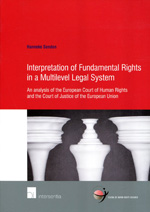Interpretation of fundamental rights in a multilevel legal system
an analysis of the European Court of Human Rights and the Court of Justice of the European Union
- ISBN: 9781780680279
- Editorial: Intersentia Ltd.
- Fecha de la edición: 2012
- Lugar de la edición: Cambridge. Reino Unido
- Colección: School of Human Rights Research Series
- Encuadernación: Rústica
- Medidas: 24 cm
- Nº Pág.: 476
- Idiomas: Inglés

Servicio de búsqueda de libros
Este libro está agotado o descatalogado por la editorial. Si lo desea podemos buscar esta obra en librerías de saldo y ocasión.
Sí, por favor búsquenme este libroFundamental rights provisions are known for their relatively vague and general formulation. As a result, judges dealing with these provisions are confronted with many and often controversial interpretative choices. These interpretative choices already present judges operating in a national context with difficulties, but even more so for European judges operating in a multilevel context. The European Court of Human Rights (ECtHR) and the Court of Justice of the European Union (CJEU) are often criticized for delivering judgments that contain debatable choices, and they do not offer sufficient insight into the reasons which led to making these choices. Especially in a multilevel context, where the cooperation of national authorities plays an important role as regards the effectiveness of the European courts, it is important that interpretation methods and principles are used in a transparent manner so that the reasons that justify a specific interpretative choice are clear. This book analyzes the use of a selected number of interpretation methods and principles in the fundamental rights case law of the ECtHR and the CJEU. The use of teleological, comparative, evolutive, and autonomous interpretation by the ECtHR and the CJEU are elaborately discussed on the basis of both legal theoretical literature and case law. The legal theoretical analysis provides the basis for various relevant questions, hypotheses, and (analytical) suggestions, that are further studied in the subsequent case law analysis. This leads to a thorough overview of the role of these interpretation methods and principles, as well as the possibilities for improvement. This volume has been written as a PhD thesis in the framework of the research project "Judicial Reasoning in Fundamental Rights Cases: National and European Perspectives."






